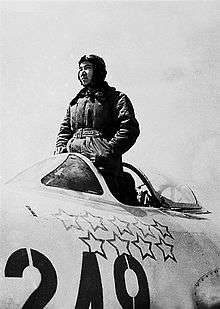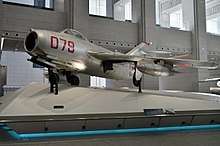Wang Hai
Wang Hai (Chinese: 王海; 19 January 1926 – 2 August 2020) was a Chinese fighter pilot and general. A flying ace of the Korean War, he served as Commander of the People's Liberation Army Air Force (PLAAF) from 1985 to 1992. He was awarded the rank of general (shang jiang) in 1988.
Wang Hai | |
|---|---|
王海 | |
 Wang Hai in the Korean War | |
| 5th Commander of the PLA Air Force | |
| In office July 1985 – November 1992 | |
| Deputy | Li Yongtai, Lin Hu, Liu Zhitian |
| Preceded by | Zhang Tingfa |
| Succeeded by | Cao Shuangming |
| Personal details | |
| Born | 19 January 1926 Yantai, Shandong, China |
| Died | 2 August 2020 (aged 94) Beijing, China |
| Political party | Communist Party of China |
| Military service | |
| Allegiance | |
| Branch/service | |
| Years of service | 1944–1992 |
| Rank | |
| Battles/wars | Korean War |

Biography
Wang Hai was born on January 19, 1926 in Yantai, Shandong Province. He joined the Communist Party of China (CPC) in September 1945 when he was a student at Weihai High School, and studied at Linyi People's Revolutionary University in Shandong. In June 1946 he entered Mudanjiang Aviator School, the first aviator training school of the CPC. In May 1950, he graduated from the training program to become a fighter pilot.[1][2]
During the Korean War (1950–53), Wang was a pilot of the 3rd Fighter Aviation Division. He shot down or damaged nine American aircraft, with his own air group scoring 29. The MiG fighter he flew is exhibited in the Military Museum of the Chinese People's Revolution in Beijing.[1]
After the war, he was promoted to command an air force division, and later Commander of the Guangzhou Military Region Air Force. In 1985, he was appointed Commander of the People's Liberation Army Air Force. When the PLA re-instituted military ranks, he was awarded the rank of general (shang jiang) in September 1988. He retired in 1992. Starting with him all PLAAF commanders have been career aviators.[2][3]
Wang Hai was a member of the 13th and 14th Central Committees of the Communist Party of China.[1]
On 19 October 2010 he led a Chinese delegation to Pyongyang to commemorate the 60th anniversary of the entry of the Chinese People's Volunteers into the Korean War.
Wang died on 2 August 2020, aged 94.[4]
See also
References
- "Wang Hai" (in Chinese). Xinhua. Retrieved 2015-08-29.
- 王海: 从朝鲜战场飞出来的空军司令员. Netease (in Chinese). 2008-06-11.
- David L. Shambaugh (2002). Modernizing China's Military: Progress, Problems, and Prospects. University of California Press. p. 159. ISBN 978-0-520-22507-7.
- "空军原司令员王海上将逝世 曾在朝鲜击落击伤9架敌机". sina.com.cn (in Chinese). 2020-08-02. Retrieved 2020-08-02.
